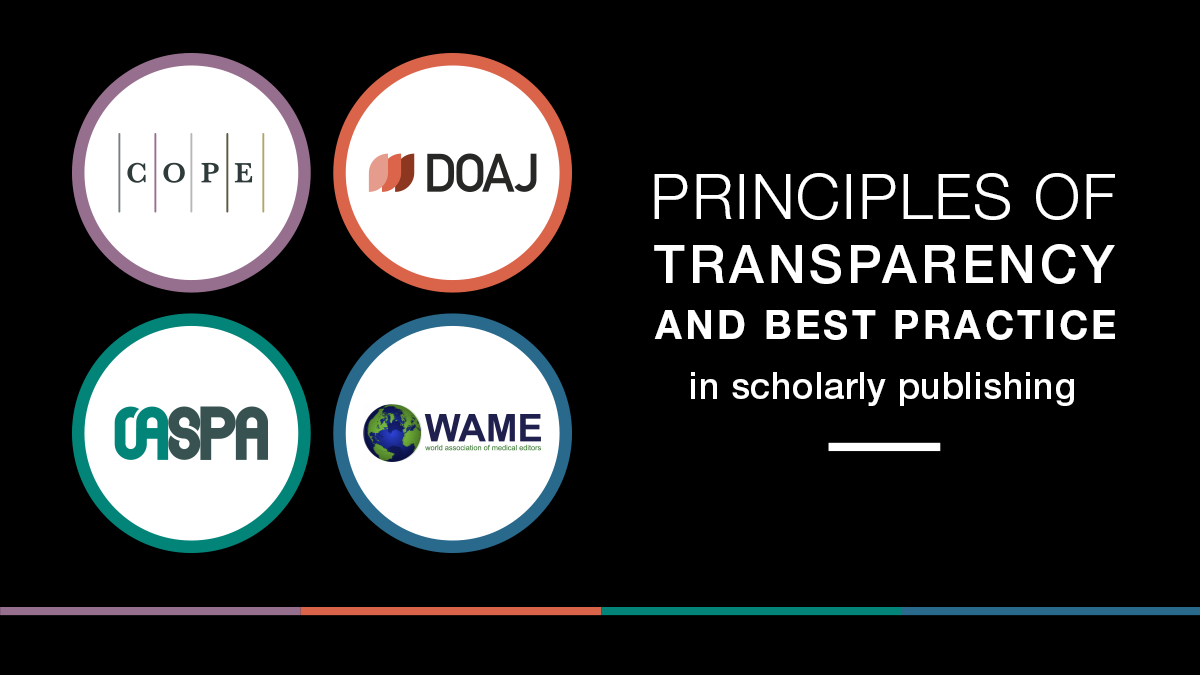
September 15, 2022 – Revised Principles of Transparency and Best Practice in Scholarly Publishing have been released by four key scholarly publishing organizations today. These guiding principles are intended as a foundation for best practice in scholarly publishing to help existing and new journals reach the best possible standards.
The fourth edition of the Principles represents a collective effort between the four organizations to align the principles with today’s scholarly publishing landscape. The last update was in 2018, and the scholarly publishing landscape has changed. Guidance is provided on the information that should be made available on websites, peer review, access, author fees and publication ethics. The principles also cover ownership and management, copyright and licensing, and editorial policies. They stress the need for inclusivity in scholarly publishing and emphasize that editorial decisions should be based on merit and not affected by factors such as the origins of the manuscript and the nationality, political beliefs or religion of the author.
Claire Redhead, OASPA Executive Director, said: “This review of the Principles has been our most intensive yet, with many new developments to consider and hone down to the essential elements that we believe all scholarly publishing can achieve, particularly small publishers in different disciplines and geographies. It’s been an important opportunity for our organizations to unite and pool our collective experience to update this well-used community resource.”
“We are pleased to release this latest revision of the principles today in collaboration with our partners. This fourth edition shows that we, as a community, are committed to future-proofing the Principles of Transparency and Best Practice for whatever lies ahead in the world of scholarly publishing and ensuring that they remain applicable to today’s publishing context and are easy to follow,” said Dominic Mitchell, DOAJ’s Operations Manager.
“After many rounds of drafts, review, and revision, we’re pleased to release the fourth version of the Transparency Principles. This new version provides more detailed instructions on achieving journal transparency, including more specifics on describing peer review practices, publication ethics policies, and author fees. As with previous versions, it emphasizes practices achievable by journals regardless of resources. This version has been thoroughly reorganized for easier use,” commented Margaret Winker, MD, WAME Trustee.
Natalie Ridgeway, COPE Executive Officer, said, “This edition of the Principles has been fully updated to provide greater depth and clarity on how to achieve transparency and best practices in journal publications for today’s publishing environment. Importantly, we believe these practices are fully achievable by all scholarly journals, regardless of size, resource, geography or discipline.”
Further information
Link: https://doaj.org/apply/transparency/
Contact Margaret Winker, MD, Trustee, WAME, mwinker@wame.org
The Committee on Publication Ethics (COPE) is a membership organization committed to educating and supporting editors, publishers, universities, research institutes and all involved in publication ethics. COPE aims to move the culture of publishing towards one where ethical practices become a regular part of the culture itself. Our approach is firmly in the direction of influencing through education, resources and support of our members, alongside the fostering of professional debate in the wider community. COPE supports members worldwide from all academic fields.
The Directory of Open Access Journals
(DOAJ) is a community-curated online directory that indexes and provides access to high quality, open access, peer reviewed journals. DOAJ has more than one hundred carefully selected volunteers from among the community of libraries and other academic disciplines to assist in the curation of open access journals. This independent database contains over 18,100 journals covering all areas of science, technology, medicine, social sciences, arts and humanities in English and 80 other languages. DOAJ is financially supported worldwide by libraries, publishers, and other like-minded organizations. DOAJ services are free for all, and all data provided by DOAJ is free and harvestable.
The Open Access Scholarly Publishing Association
(OASPA) is a diverse community of organizations engaged in open scholarship. As an organization, we work to encourage and enable open access as the predominant model of communication for scholarly outputs. We are committed to our mission of developing and disseminating solutions that advance open access and ensure a diverse, vibrant, and healthy open access community. Our membership includes scholar-led and professional publishers of books and journals across varied geographies and disciplines, as well as infrastructure and other services. We apply rigorous criteria and in-depth review to all members, who must continue to exemplify high standards to remain part of OASPA.
The World Association of Medical Editors (WAME) is a global nonprofit voluntary association of editors of peer-reviewed medical journals who seek to foster cooperation and communication among editors, improve editorial standards, promote professionalism, and encourage research on the principles and practice of medical editing. WAME develops policies and recommendations for best practices for medical journal editors; has an active listserve for members to discuss important issues and seek input from other members; and a monthly newsletter, a compilation of articles, resources, and research of interest to medical journal editors.
